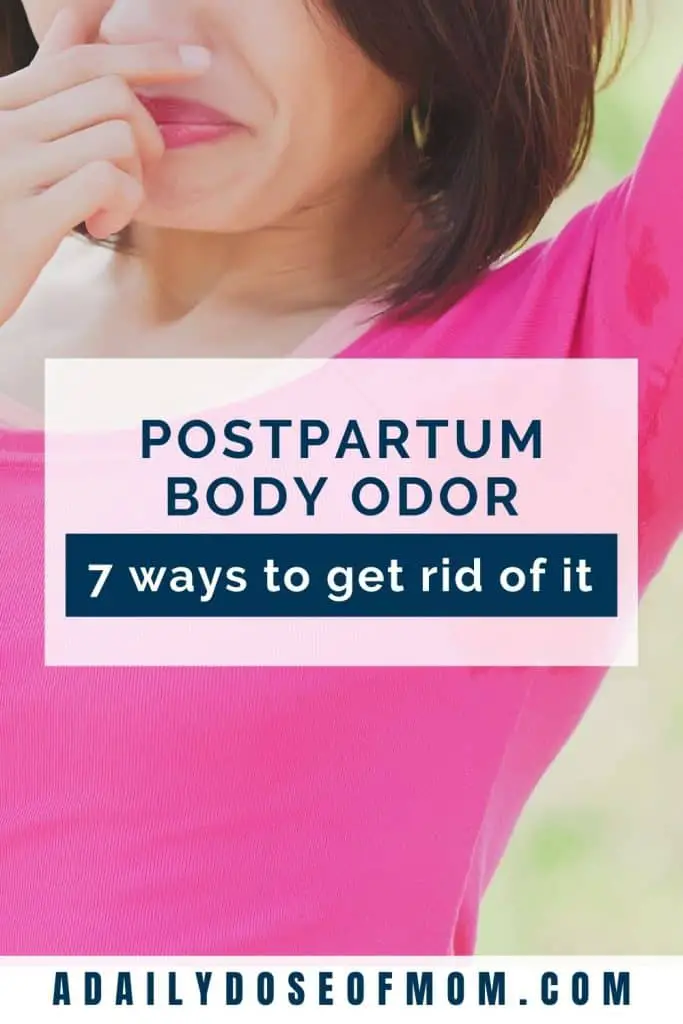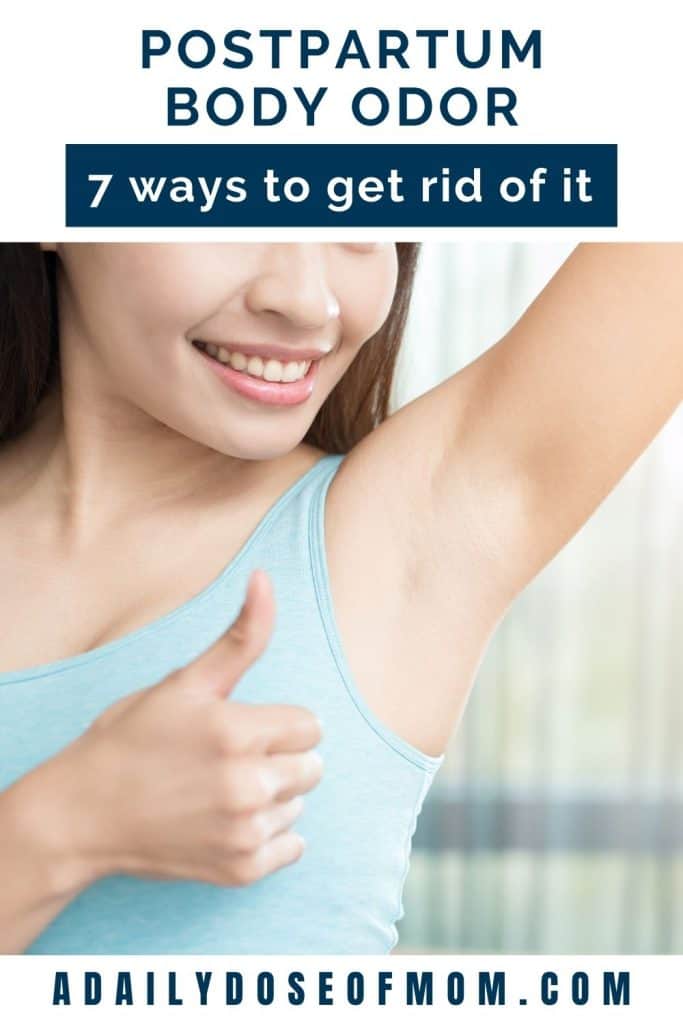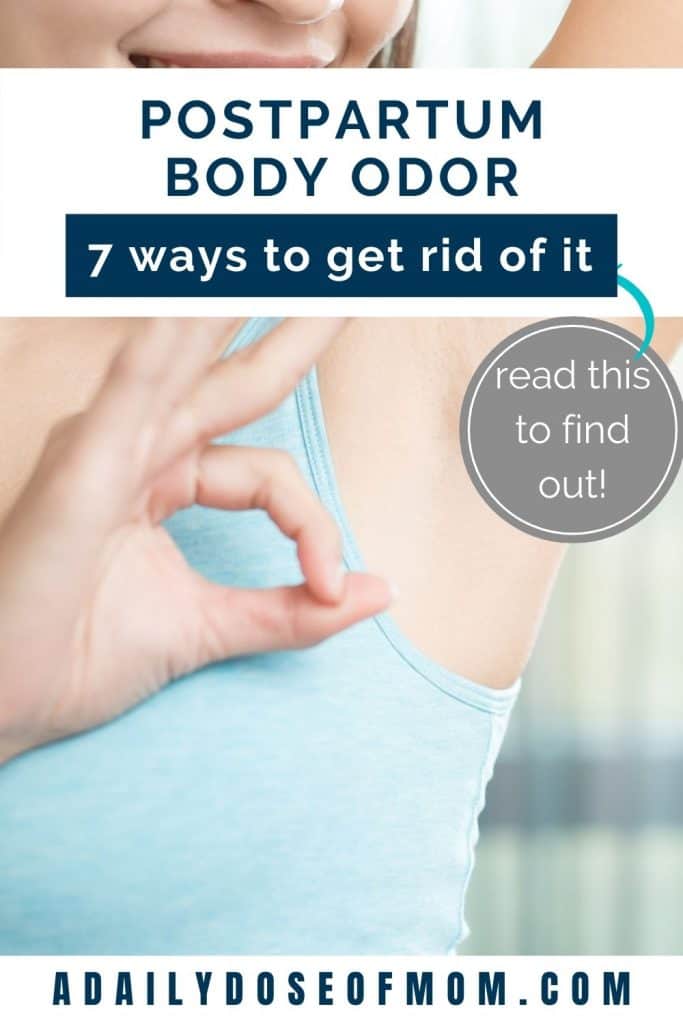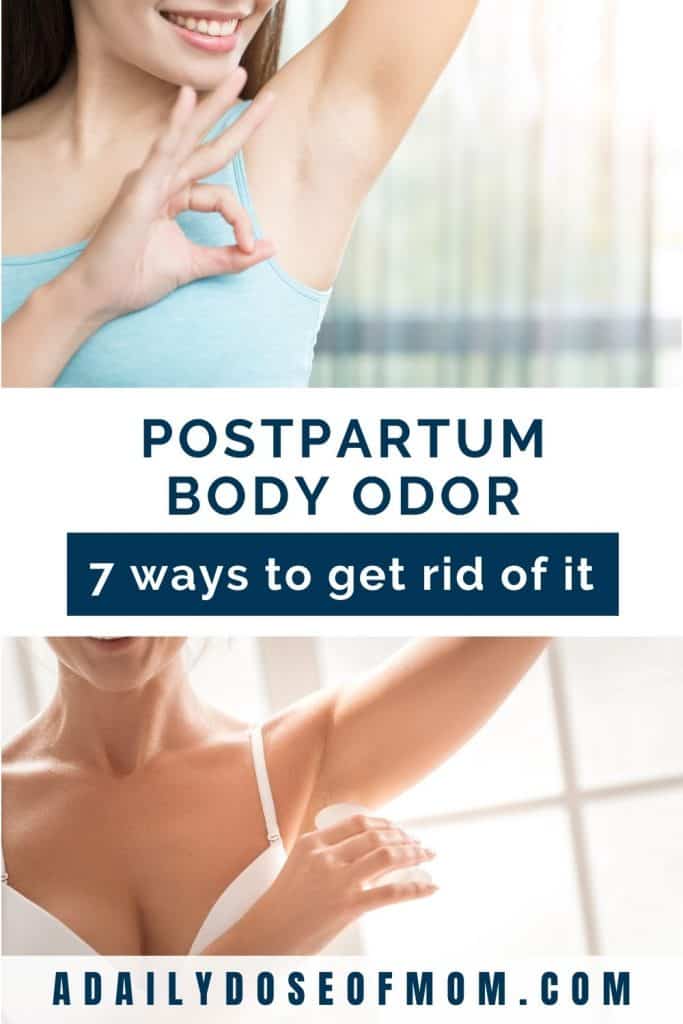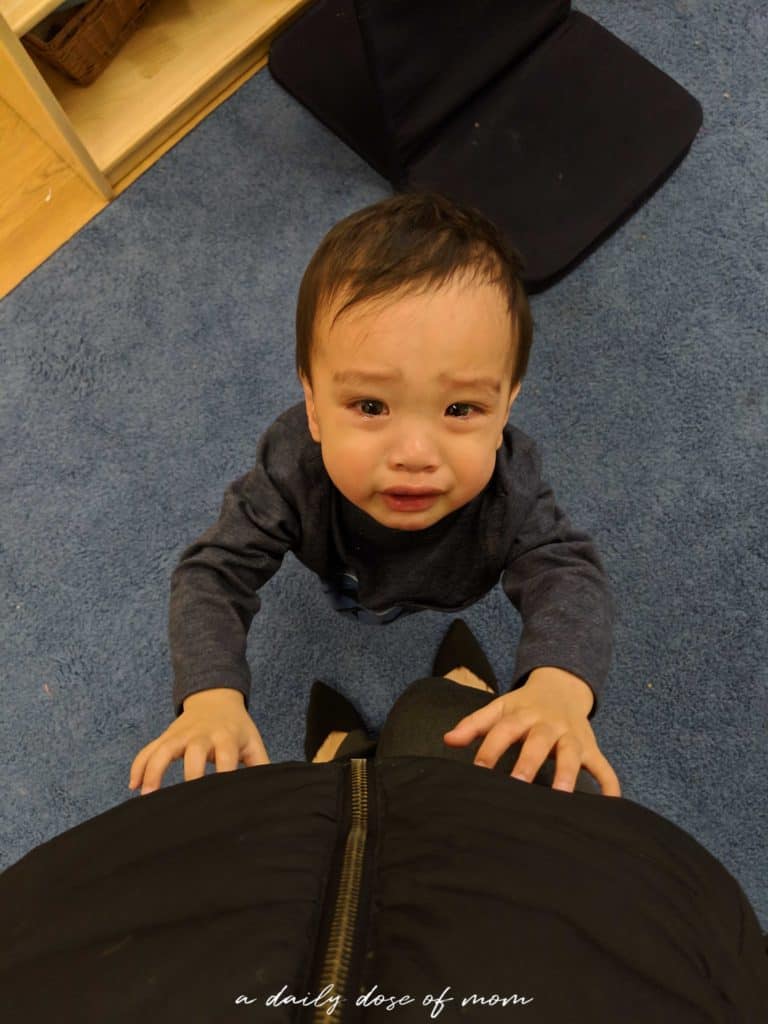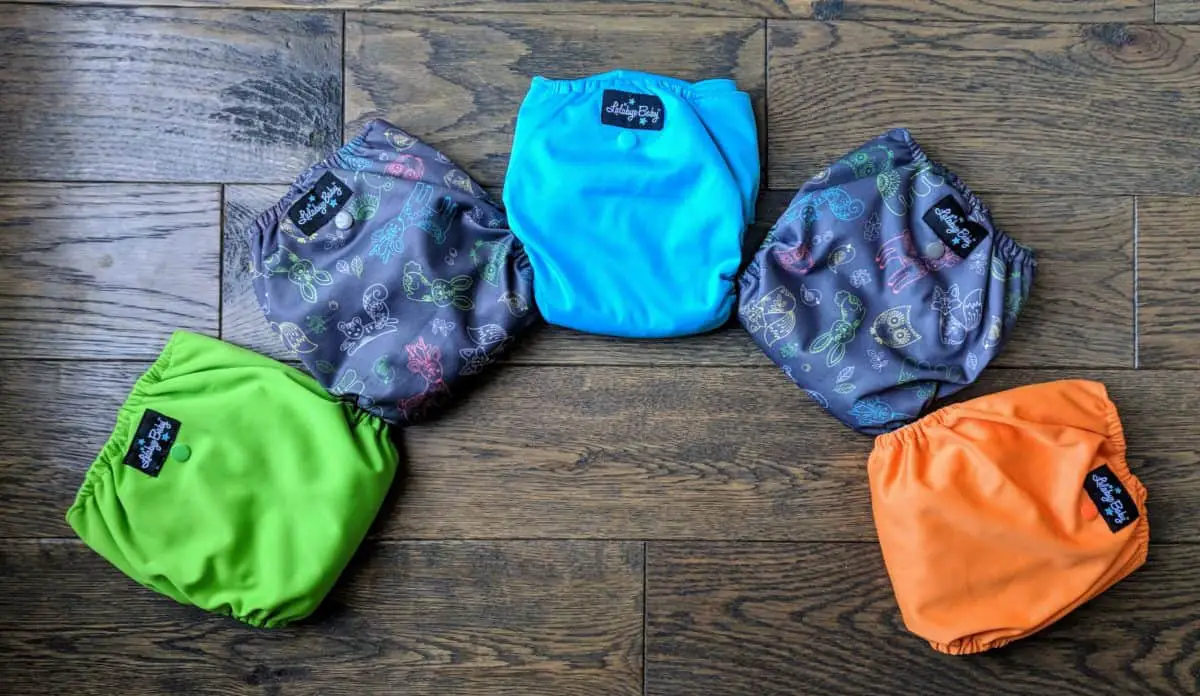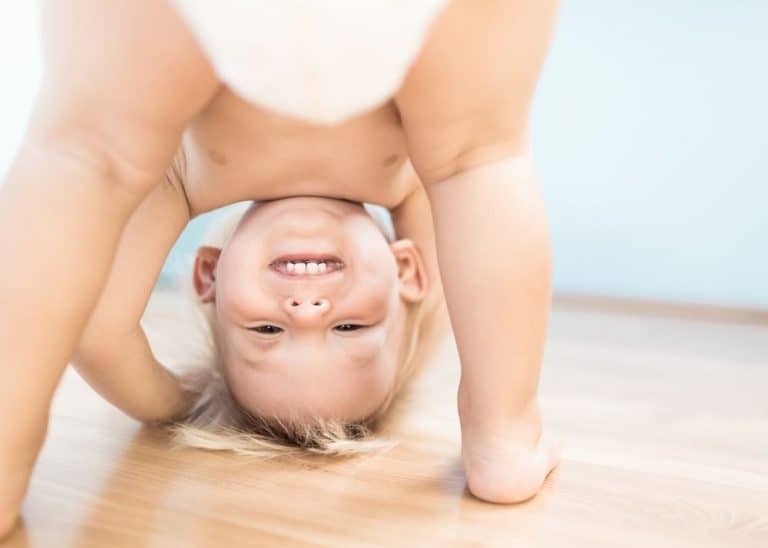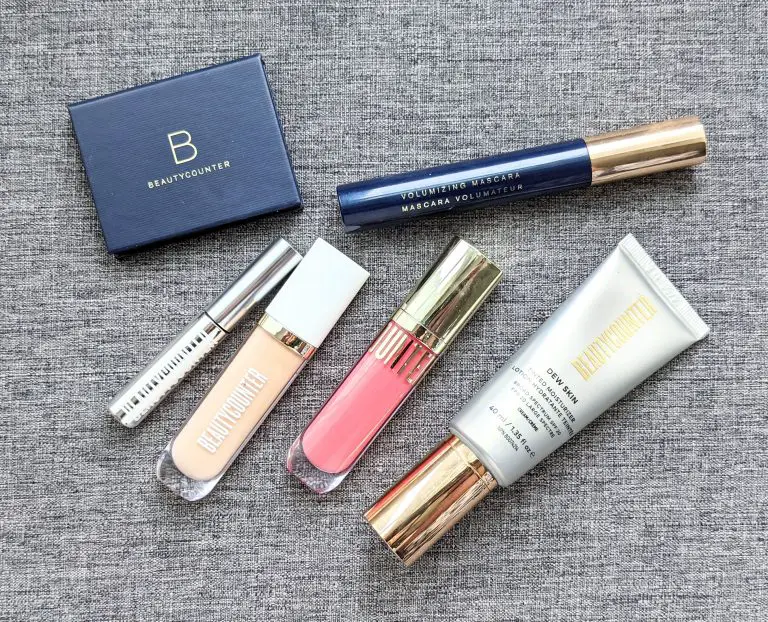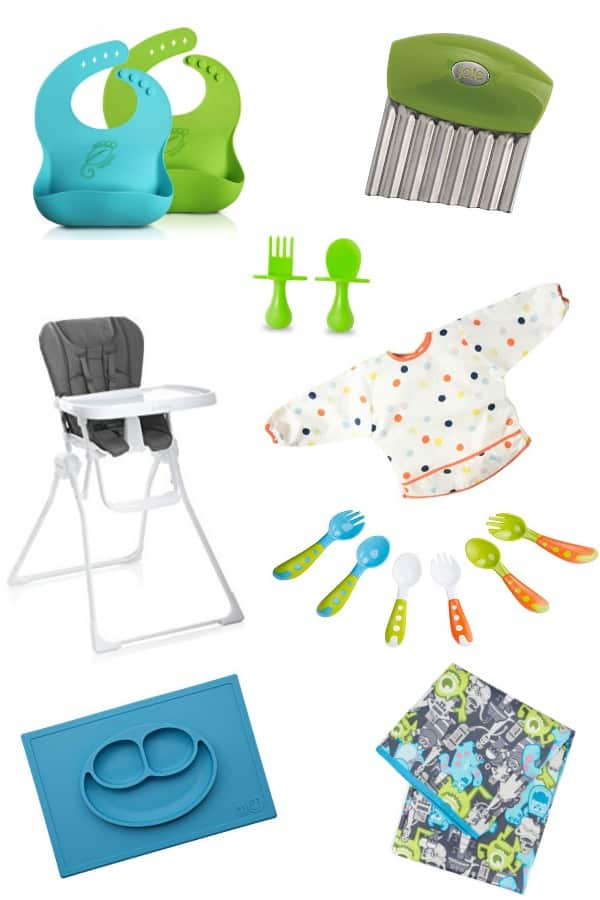How to Get Rid of Postpartum Body Odor: 8 Effective Methods
Postpartum body odor. One of the things that nobody ever warns you about when having a newborn baby. Yet here you are in all your postpartum glory! Not only are you leaking and sleep-deprived, but now you have an unpleasant smell. Great. There are a lot of changes during this period, mama.
But good news! Here are 8 ways to get rid of body odor after pregnancy:
- Shower frequently
- Remove extraneous body hair
- Use deodorant
- Hydrate well
- Wear breathable clothing
- Avoid alcohol
- Apply Apple cider vinegar
- Apply fresh lemon or lime juice
Keep reading for specific details on each method and say goodbye to postpartum B.O.!
This post contains affiliate links, which means I receive a small commission, at no extra cost to you, if you make a purchase using this link. Please see my disclosure for more details.
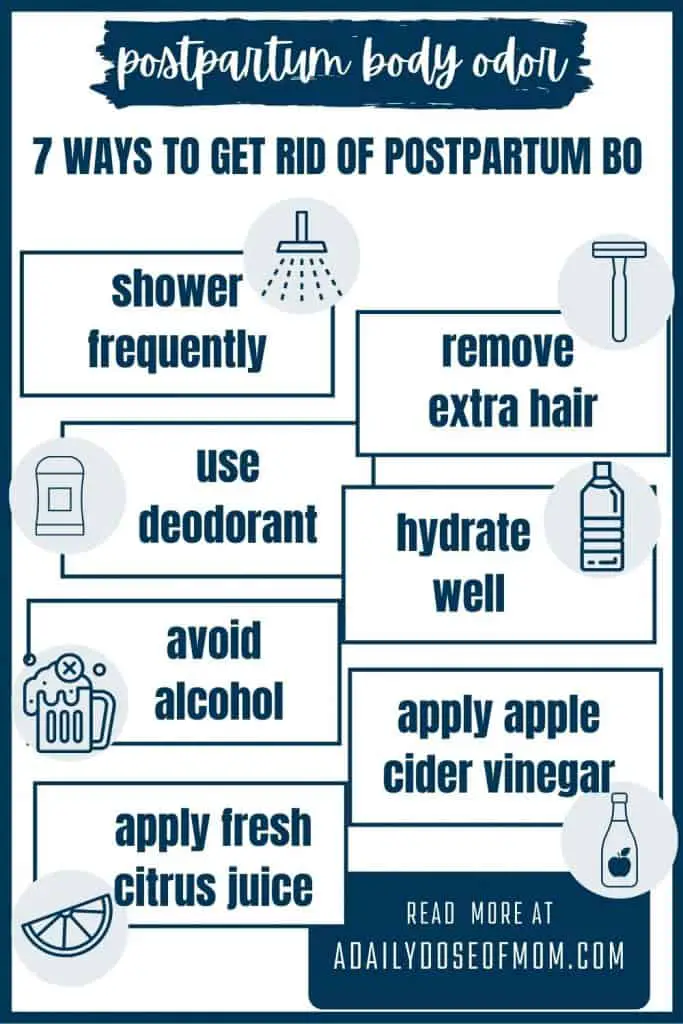
1. Shower Frequently
I know…you’re a new mom. We’re lucky if we shower every few days, right? But not only will regular showers improve your mental health, but they will also keep unpleasant odors at bay.
New moms suffer from postpartum night sweats. So consider showering first thing in the morning so you can start the day fresh and clean.
Add in an extra shower before bedtime as well, if you can.
2. Remove Extraneous Body Hair
Removing extraneous body hair can be an effective way to manage postpartum body odor. Hair can trap sweat, bacteria, and odor, leading to an increase in unpleasant smells. By removing excess body hair, you can reduce the chances of these odors lingering. Here are some methods to consider:
- Shaving. Shaving is a popular and convenient method to remove body hair. You can use a razor to shave areas prone to sweating, such as the underarms and legs. Ensure you use a clean, sharp razor and shaving cream or gel to minimize the risk of irritation or cuts.
- Waxing. Waxing offers longer-lasting results compared to shaving. It involves applying warm wax to the skin and pulling it off, removing the hair from the root. Waxing can be done at home using ready-to-use wax strips or by visiting a professional esthetician.
- Depilatory creams. Depilatory creams are chemical-based products that dissolve the hair at the skin’s surface. Apply the cream to the desired area, leave it on for the recommended time, and then wipe or rinse it off. Follow the instructions carefully and do a patch test before using a depilatory cream to ensure it suits your skin.
- Laser hair removal. If you’re looking for a more permanent solution, laser hair removal is an option to consider. This procedure uses laser technology to target and destroy hair follicles, resulting in long-term hair reduction. It’s usually performed by a trained professional and requires multiple sessions for optimal results.
- Electrolysis. Electrolysis is another method that offers permanent hair removal. It involves inserting a tiny needle into each hair follicle and applying an electrical current to destroy the follicle. Electrolysis is usually performed by a licensed electrologist and requires multiple sessions for complete hair removal.
Before choosing a hair removal method, consider your personal preferences, skin sensitivity, and any specific postpartum considerations. It’s important to follow good hygiene practices after hair removal to maintain cleanliness and minimize the risk of infections.
By removing excess body hair, you can decrease the surface area where sweat and bacteria can accumulate, ultimately reducing the likelihood of postpartum body odor. Remember to choose a method that suits your needs and consult with a professional if you have any concerns or questions.

3. Use Natural Deodorant
After showering and removing extra body hair, it’s important to use a clinical-strength deodorant to stop underarm odor. Here are some great options:
Lumé Deodorant
Developed by an OB-GYN, Lumé deodorant is touted as the “World’s First Whole Body Deodorant”. You can use it in your underarm area like regular deodorant. You can also use it as a cream! Use your fingertips to swipe it anywhere else on the body that’s needed: feet, private parts, inner thighs, etc.
It’s free from aluminum and other chemicals that can clog your pores and trap toxins. Lumé is water-based so it won’t stain your clothes with sticky residue. It’s also like a cream so it rubs in like a lotion.
All of this AND Lumé lasts 72 hours! Opt for a traditional stick, tube, or cotton wipes for on-the-go deodorizing. To make it even better, there are bundles that you can build yourself. This way, you can sample the different formulations and scents. My favorite scent is Jasmine Rose. But you can choose from scents such as Warm Vanilla, Lavender Sage, or Clean Tangerine. There’s also an unscented version if you prefer.
Earth Mama Deodorant
Earth Mama has a line of deodorants that is completely organic. They are free from propylene glycol, artificial fragrances, parabens, and aluminum. These deodorants are formulated for sensitive skin and tested by dermatologists for irritation. They are also available on Amazon!
Choose from scents like Ginger Fresh, Bright Citrus, Calming Lavender, or unscented.

4. Drink Lots of Water
Staying hydrated is not only essential for your overall health but can also help in managing postpartum body odor. When you drink enough water, your body can regulate its temperature more efficiently, which can reduce sweating and minimize the chances of developing body odor. Here are some tips on staying hydrated to combat postpartum body odor:
- Drink an adequate amount of water: Aim to drink at least 8-10 glasses (64-80 ounces) of water per day. Drinking water helps maintain proper hydration levels, dilutes sweat, and helps flush out toxins from your body.
- Include hydrating foods in your diet: In addition to drinking water, consume hydrating foods such as fruits and vegetables. Watermelon, cucumbers, oranges, strawberries, and lettuce are examples of foods with a high water content that can contribute to your overall hydration.
- Keep a water bottle handy: Carry a reusable water bottle with you wherever you go. Having a water bottle within reach will serve as a reminder to drink water regularly throughout the day.
- Set reminders: If you often forget to drink water, set reminders on your phone or use apps designed to track your water intake. These reminders can prompt you to take regular sips and ensure you’re meeting your hydration goals.
- Drink before, during, and after physical activity: If you engage in physical activity, make it a habit to drink water before, during, and after your workout. Sweating during exercise can increase the risk of dehydration, so replenishing fluids is crucial.
5. Wear Breathable Clothing
One effective way to combat postpartum body odor is to choose breathable clothing. Wearing the right fabrics can help promote air circulation, reduce sweat buildup, and minimize the chances of developing unpleasant odors. Here are some tips for selecting and wearing breathable clothing:
- Opt for natural fabrics: Natural fabrics like cotton, linen, and bamboo are excellent choices for breathable clothing. These breathable materials allow air to flow freely, preventing sweat from getting trapped against your skin. They also have moisture-wicking properties, which can help keep you dry and comfortable.
- Avoid synthetic materials: Synthetic fabrics such as polyester, nylon, and rayon tend to trap heat and moisture, making them less breathable. Try to limit the use of synthetic materials in your postpartum wardrobe, especially in areas prone to sweating.
- Choose loose-fitting garments: Tight clothing can restrict airflow and increase sweat retention, leading to body odor. Opt for loose-fitting tops, dresses, and pants that allow your skin to breathe. Flowy styles not only promote ventilation but also provide a comfortable and forgiving fit during the postpartum period.
- Consider moisture-wicking activewear: If you’re engaged in physical activities or exercise, invest in moisture-wicking activewear. These specially designed garments are made with fabrics that draw moisture away from the body, keeping you dry and odor-free even during intense workouts.
- Layer strategically: Layering your clothing can help manage body temperature and prevent excessive sweating. Instead of wearing heavy or thick layers, opt for lightweight and breathable options. Choose thin, breathable undershirts or tank tops that can absorb moisture and keep your outer garments fresh.
- Pay attention to undergarments: Selecting breathable undergarments is just as important as choosing breathable clothing. Look for underwear and bras made from natural fibers like cotton, which allow for air circulation and moisture absorption. Avoid synthetic materials or tight undergarments that can trap sweat and contribute to odor.
- Keep clothing clean: Regularly launder your clothing to remove sweat, bacteria, and odors. Follow the care instructions on the garment labels, and consider using detergents that are gentle on fabrics and free from strong fragrances or additives that can mask odors.
6. Avoid Alcohol
Alcohol has undesirable effects that can lead to body odor after giving birth. Alcohol can increase your body temperature, leading to increased excretion from sweat glands. Not only that but when alcohol mixes with the bacteria on your skin, there is a distinct odor that is released.
7. Douse in Apple Cider Vinegar
Okay, maybe not exactly douse in apple cider vinegar. But apple cider vinegar, or ACV, is naturally antibacterial, antifungal, and antiseptic. It eliminates postpartum body odor by eliminating odor-causing bacteria.
You can use a soap specifically formulated with ACV. Examples include:
But don’t worry! You don’t have to spend money to smell good either. You can use the bottle of ACV that is sitting in your pantry. Soak it onto a disposable or reusable cotton pad and wipe it wherever a refreshing is needed.
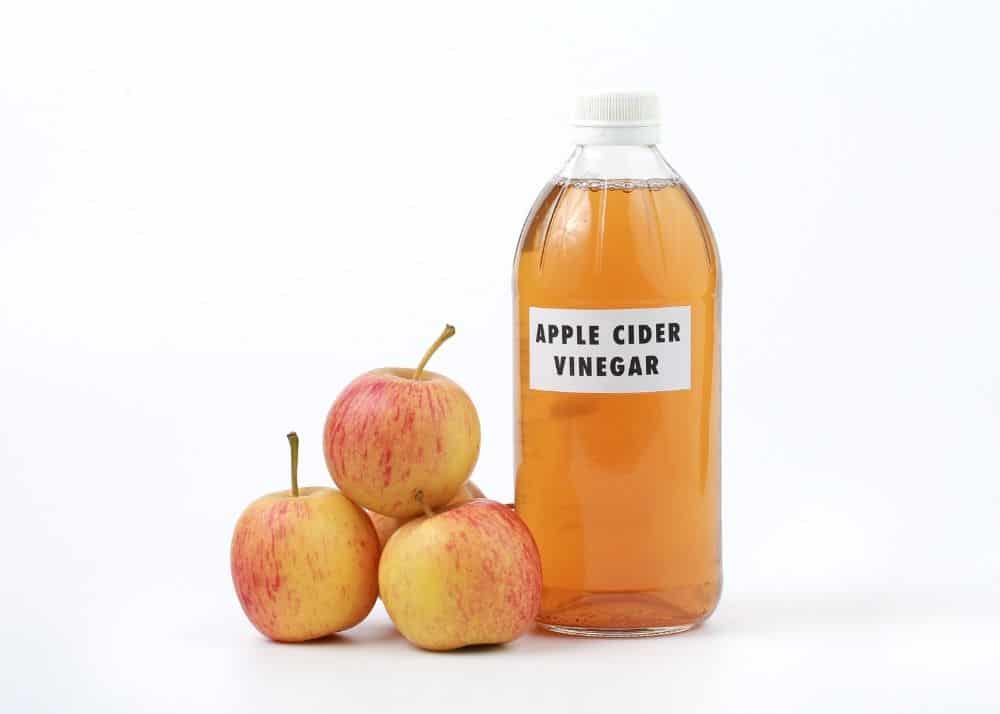
8. Apply Fresh Lemon or Lime Juice
Another option for getting rid of strong body odor after pregnancy is to use fresh lemon or lime juice. Simply rub a fresh wedge or a cotton pad soaked with lemon or lime juice under your armpits about 5 minutes before showering.
The citrusy smell will camouflage any undesirable smells. Also, lemon and lime juice have antioxidant and antibacterial activity. Finally, the high pH will create an environment that makes it difficult for bacteria to survive.
It is important to note that citrus juice can irritate the skin if overused. It can also cause your skin to become more sensitive to the sun. Take precautions with sun exposure and stop using lemon or lime juice if you develop irritation.

Frequently Asked Questions about Postpartum Body Odor
Body Odor After Pregnancy And How to Deal
Unfortunately mama, body odor after pregnancy is another thing we will have to deal with in the postpartum period. Welcome to the fourth trimester! The best thing we can do is accept it and know that there are options for getting rid of it. And realize that you are not alone!
To recap, the options for getting rid of postpartum BO are:
- Shower frequently
- Remove extraneous body hair
- Use deodorant
- Hydrate well
- Wear breathable clothing
- Avoid alcohol
- Use apple cider vinegar
- Apply fresh citrus juice
Have you suffered from strong body odor after pregnancy? What have you tried to help get rid of it? Let’s chat and support each other in this wonderful (but smelly) postpartum phase. 🥰

